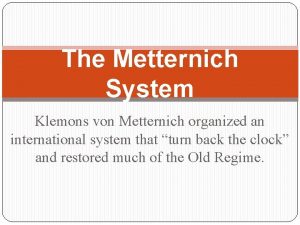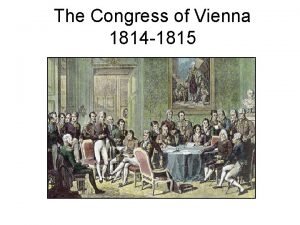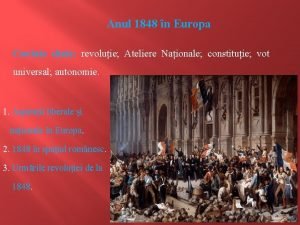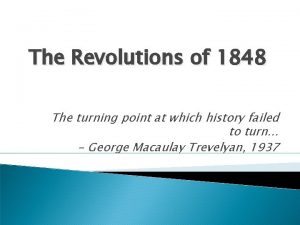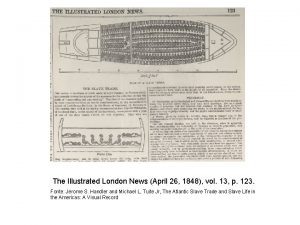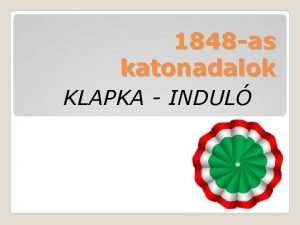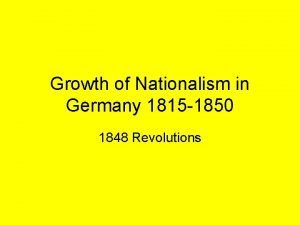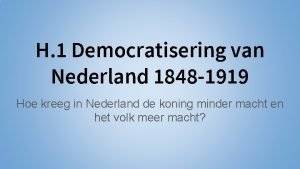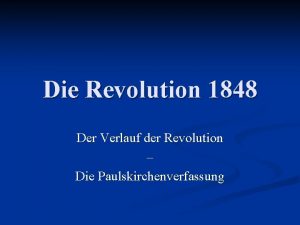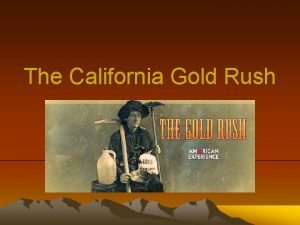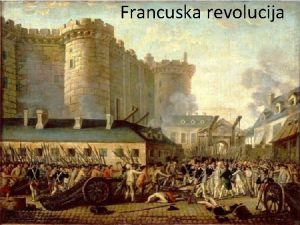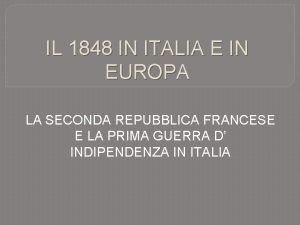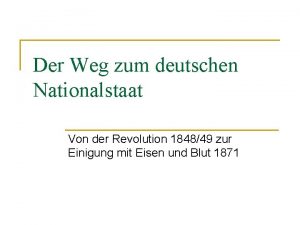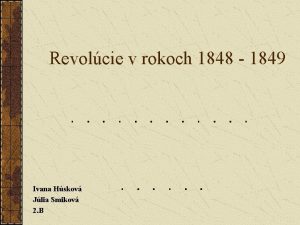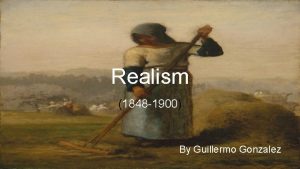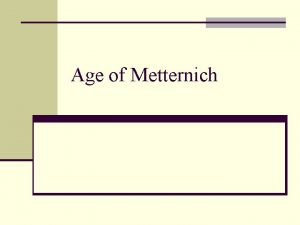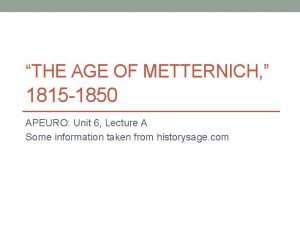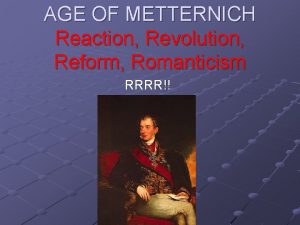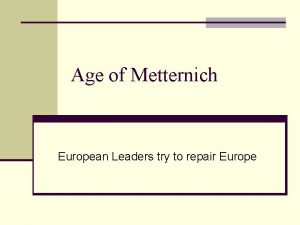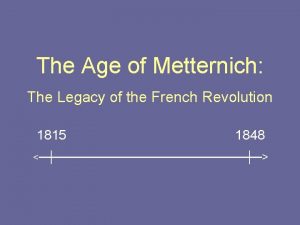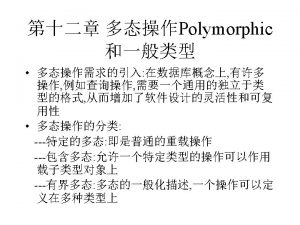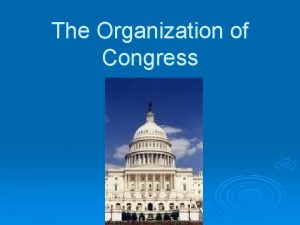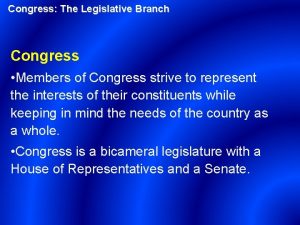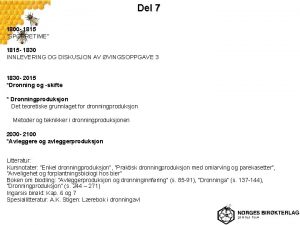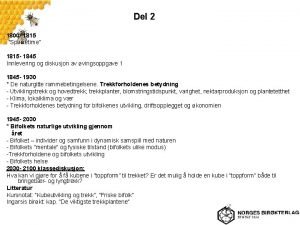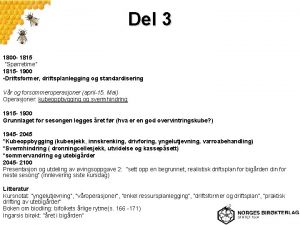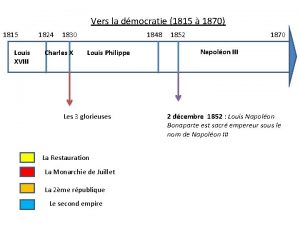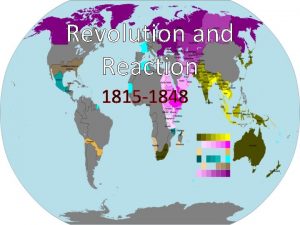Age of Metternich 1815 1848 The Congress of


































- Slides: 34

Age of Metternich (1815 -1848)

The Congress of Vienna (1814 -15) After Napoleon's first abdication in April 1814, representatives of all the states of Europe met in Vienna in order to decide what to do now that the Napoleonic threat had disappeared. They had three priorities: 1. To reduce the size of France to its frontiers before the Revolutionary War of 1792 2. To ensure that France could never again pose a threat to the rest of Europe, especially to the east. 3. To reward those countries that had been "anti. Napoleon" and punish those that had been "pro. Napoleon".

Congress of Vienna – Quadruple Alliance All of the European countries and States were represented at the Congress, with the sole exception of Turkey. But, the real decisions were made by the members of the Quadruple Alliance (Austria, Prussia, Great Britain and Russia)

Prince Metternich 1815: We have redrawn Europe’s map for eternity.


Work of the Congress of Vienna Country Territory Acquired Territory Ceded Austria Lombardy, Venetia, Parma, Modena, Tuscany, Milan Austrian Netherlands (to the Dutch) Prussia 2/5 of Saxony, small part of Poland, area along the Rhine River Part of Poland (to Russia) Russia Grand Duchy of Warsaw Finland None Great Britain Island of Helgoland, French West Indies, Guiana, Malta, Cape Colony, Ceylon None France None Territories acquired after 1792 Sweden Norway Finland (to Russia) Netherlands Austrian Netherlands Colonies lost to Great Britain: Cape Colony, Ceylon, Guiana Denmark None Norway (to Sweden), Island of Helgoland (to Great Britain) Sardinia Savoy, Genoa None

An Evaluation of the Congress of Vienna • Statesmen at the Congress of Vienna were criticized for ignoring the liberal & nationalist aspirations of many people. • They underestimated the new nationalism and liberalism generated by the French Revolution. • However, not until the unification of Germany in 1870 -71 was the balance of power upset. • Not until World War I did Europe have another general war.

Liberal and Conservative Ideas of 1800 s LIBERAL Male property Owners Protect basic right to life, liberty, property Republic with constitution and separation of powers Laissez-faire Freedom of religion Middle Class (Bourgeoisie) CONSERVATIVE Who Should Rule Goals of Government Monarch and nobles Stability and order Monarchy Form of Government Economy Religion Support by Controlled by nobles Established church Nobility Peasants

Nationalism • Powerful ideology that arose out of an awareness of being part of a community that has common institutions, traditions, language, customs, symbols; focus of loyalty • Nationalists believed each nationality should have its own government • Therefore, it threatened to upset the existing political order and destroy the balance of power established at Vienna. • The desire for national self-determination was used by both liberals and conservatives to promote their agendas.

Balance of Power Politics • Holy Alliance – vague idea of czar • Quadruple Alliance – more practical v Military cooperation in the event of the resumption of revolutionary activity or French aggression v Concert of Europe - international “policing” of Europe to maintain the status quo which they defined v 1818 – France restored to full status • The principle of collective security was established.

Metternich System • Repression/spies/censorship • Metternich turned Concert of Europe into an instrument for suppressing liberal ideas and nationalist revolts everywhere in Europe • Opposition by Great Britain • Successes in 1820’s in German Confederation, Spain, Italian states • Failures – South American Revolutions US Monroe Doctrine Strong British opposition

Latin American Independence Movements

Independence Movements in the Balkans

Independence for Serbia (1804 – 1817) • Revival of Serbian literature, music, folklore, culture • 1 st revolt unsuccessful against Ottoman Empire • Turned to Russia for assistance – Slavic language – Christian Orthodox Religion • 2 nd Revolt: Miloš Obrenović led successful revolt (1815 -1817) • Serbia got autonomy (1833) • Not the last time Russians affected events in the Balkans

Second Serbian Uprising Against Turks with Miloš Obrenović

Greek War of Independence • Ottoman Empire – inefficient, corrupt, “Sick Man of Europe” • Influence of French Revolution, secret societies to foster teachings of classical Greece • 1821 – Greek revolt • – failed to get support of other Balkan groups – Turkish reprisals • destroyed churches under their control • massacred the men • sold the women into slavery

In 1821, the bishop Germanos of Patras raised the Greek flag at the Monestary of Agia Lavra in the Peloponnesus and began the War of Independence against the Ottoman Turks

• Greek use of guerrilla warfare • Philhellenic societies around the world • Individuals came to Greek support, e. g. Lord Byron • 1825 Egyptian support of Turkey – Mohammed Ali • Russia motivation to aid the Greeks (new czar Nicholas I) • 1827 - Great Britain and France move to support Greeks

Greece on the Ruins of Missilonghi by Delacroix, 1827 • 1829 – Greek independence • No republic, but constitutional monarchy until 1973 • German prince awarded throne • Significance of Greek War of Independence: Virtual End of the Metternich System

Revolutions of 1830

France: The “Restoration” Era (1815 -1830) • Louis XVIII governed France as a Constitutional monarch (1814 -1824): Charter of French Liberties. • His brother, Charles X (1824 -1830) rejected the Charter, suspended parliament, limited the right to vote and restricted the press: “July Ordinances”

To the Barricades! • Middle Class revolted and replaced Charles with a cousin from a rival branch of the royal line Louis Philippe – the “Citizen King” • King got his sovereignty from the people (the wealthy middle class)


Liberty Leading the People Eugene Delacroix, 1830

Spirit of Revolution Spreads • So… France was now more liberal and nationalistic • The Revolution of 1830 in France served as an inspiration for other revolutions in Europe The Uprising Honoré Daumier (1808 -1878)


Belgian Revolution - 1830 § Problems of Forced Union with Dutch § Buffer state against France § Wide cultural differences: DUTCH BELGIANS Dutch language French & Flemish Calvinist Roman Catholic Seafarers and traders Farmers and industrial workers Free Trade Tariffs

Belgian Revolution • Belgian student uprising supported by Britain and France. • Non-interference by major powers • Treaty of London 1839 – Perpetual Neutrality – Constitutional Monarchy – Leopold I, who took the title “King of the Belgians”

Episode of the Belgian Revolution of 1830

A Stirring of Polish Nationalism

1500 Until 1600 s, one of largest, most advanced countries in Europe

Disappearance of Poland: Partitions (1772, 1793, 1795) Austria, Prussia, Russia

Napoleonic Grand Duchy of Warsaw (1807)

• The Poles in and around Warsaw gain a special status by the Congress of Vienna within the Russian Empire. • Local autonomy granted in 1818.
 Metternich system
Metternich system Stone age, bronze age iron age timeline
Stone age, bronze age iron age timeline Iron age bronze age stone age timeline
Iron age bronze age stone age timeline Kelvirág lengyelesen
Kelvirág lengyelesen Chapter 7 section 5 the congress of vienna
Chapter 7 section 5 the congress of vienna What was the metternich system
What was the metternich system What was the overall effect of metternich's plan on france
What was the overall effect of metternich's plan on france Political wish new
Political wish new What were metternich's three goals
What were metternich's three goals Metternich system
Metternich system French revolution
French revolution Leto 1848 in slovenci
Leto 1848 in slovenci Anul 1848 in europa
Anul 1848 in europa Austroslavism
Austroslavism Illustrated london news 1848
Illustrated london news 1848 Emancipace žen 1848
Emancipace žen 1848 48 as katonadalok
48 as katonadalok Humiliation of olmutz
Humiliation of olmutz Democratisering van nederland 1848 tot 1919
Democratisering van nederland 1848 tot 1919 Revolution 1848 verlauf
Revolution 1848 verlauf January 24, 1848
January 24, 1848 Leto 1848 leto revolucij
Leto 1848 leto revolucij Francuska u 17 st
Francuska u 17 st Why did the 1848 revolutions fail
Why did the 1848 revolutions fail Bolzano (1781 – 1848)
Bolzano (1781 – 1848) Il 1848 in europa e in italia
Il 1848 in europa e in italia Revolucije u evropi
Revolucije u evropi Revolucije u europi 1848
Revolucije u europi 1848 Leto 1848 in slovenci
Leto 1848 in slovenci 1848 revolution germany
1848 revolution germany Austrian empire 1848
Austrian empire 1848 Norddeutscher bund
Norddeutscher bund Francúzska revolúcia 1848
Francúzska revolúcia 1848 Realism (1848–1900)
Realism (1848–1900) Lovelace 1815
Lovelace 1815





